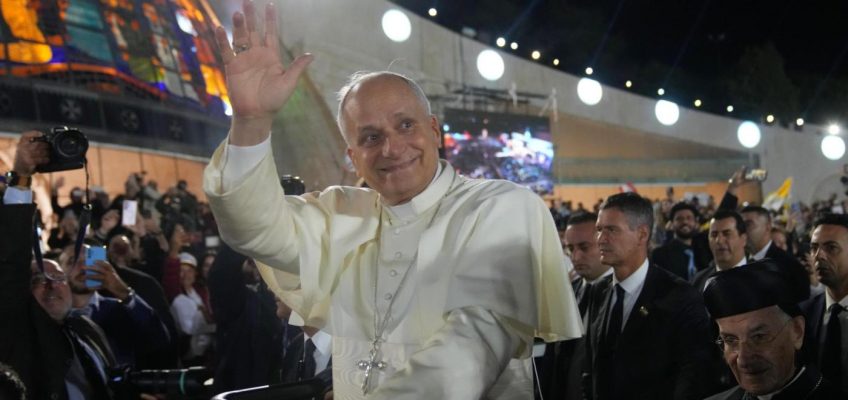By NICOLE WINFIELD, KAREEM CHEHAYEB and BASSEM MROUE
BEIRUT (AP) — Pope Leo XIV prayed Tuesday at the site of a deadly 2020 Beirut port explosion that has become a symbol of dysfunction and official impunity and called for justice to prevail, as he offered words of consolation to Lebanon’s people — including in the war-battered south — on the final day of his first overseas trip.
Related Articles
More than 1,300 dead from floods in Indonesia, Sri Lanka and Thailand as rescue efforts intensify
Israeli forensics experts examine remains handed over by fighters in Gaza
Russian skiers and snowboarders allowed by CAS to try to qualify for Winter Olympics
Afghanistan’s Taliban rulers carry out public execution in sports stadium in eastern city
Putin accuses Europeans of sabotaging peace efforts on Ukraine and meets US delegation
Relatives of some of the 218 people killed by the blast held up photos of their loved ones as Leo arrived at the scorched site. They stood side by side as Leo prayed silently first at a monument to the dead, then greeted each one, grasping their hands.
The emotional encounter took place next to the shell of the last grain silo standing at the site destroyed by the Aug. 4, 2020, blast and the piles of burned cars torched in its wake. The explosion did billions of dollars in damage as hundreds of tons of ammonium nitrate detonated in a port warehouse.
Five years on, the families of those killed are still seeking justice. No official has been convicted in a judicial investigation that has been repeatedly obstructed, angering Lebanese for whom the blast was just the latest evidence of impunity after decades of corruption and financial crimes.
“The visit clearly sends the message that the explosion was a crime,” said Cecile Roukoz, whose brother, Joseph Roukoz, was killed and who was on hand to meet the pope. “There should be a message, the country should end impunity and ensure justice is served.”
Pope Leo XIV waves as he boards a flight back to the Vatican after his visit to Lebanon at Beirut International Airport in Beirut, Lebanon, Tuesday, Dec. 2, 2025. (AP Photo/Hussein Malla)
When he arrived in Lebanon on Sunday, Leo urged the country’s political leaders to pursue the truth as a means of peace and reconciliation. In a homily Sunday after praying at the site, Leo referred explicitly to the blast and called for Lebanon to be a place of justice.
Pope calls for justice at Mass
An estimated 150,000 worshippers packed the Beirut waterfront for Leo’s final Mass, which he celebrated immediately after praying at the nearby blast site.
In his homily, Leo named the many problems the Lebanese people have faced, from economic crises to the blast and renewed fears of war. He said it’s natural to feel “paralyzed by powerlessness in the face of evil and oppressed by so many difficult situations.”
But he urged them not to be resigned, and to find ways to remain hopeful and grateful. He insisted, though, that justice was part of the equation.
“Let us cast off the armor of our ethnic and political divisions, open our religious confessions to mutual encounter and reawaken in our hearts the dream of a united Lebanon,” he said. “A Lebanon where peace and justice reign, where all recognize each other as brothers and sisters.”
“Lebanon, stand up! Be a home of justice and fraternity! Be a prophetic sign of peace for the whole of the Levant!”
An emotional visit to the hospital
The American pope opened his final day in Lebanon with an emotional visit to the De La Croix hospital, which specializes in care for people with psychological problems. Awaiting him were some familiar-looking faces: young boys dressed up as Swiss Guards and cardinals, and even one dressed as the pope himself in all white.
Rose petals are scattered to Pope Leo XIV as he leaves after visiting the Psychiatric Hospital of the Cross in the town of Jal el-Dib, north of Beirut, Lebanon, Tuesday, Dec. 2, 2025. (AP Photo/Hassan Ammar)
The mother superior of the congregation that runs the hospital, Mother Marie Makhlouf, was overcome as she welcomed the pope, telling him that her hospital cares for the “forgotten souls, burdened by their loneliness.”
Leo said the facility stands as a reminder to all of humanity. “We cannot forget those who are most fragile. We cannot conceive of a society that races ahead at full speed clinging to the false myths of well-being, while at the same time ignoring so many situations of poverty and vulnerability,” he said.
“For Lebanon, (the visit) means a lot,” said pilgrim Maggie Claudine, who was waiting for Leo at the hospital. “We hope that peace will prevail, and that is what we wish for. We want to live in comfort.”
Families of blast dead seek justice
Leo has sought to bring a message of peace to Lebanon as it copes with the economic crises, the aftermath of last year’s devastating war between Hezbollah and Israel and the fallout from the port blast.
Among those on hand to welcome Leo at the blast site was Lebanon Social Affairs Minister Haneen Sayed, whose mother was killed. Another was Mireille Khoury, whose 15-year-old son, Elias, was killed.
When Leo approached her, Khoury pointed to the building where they lived across the port, where Elias died as he was hanging out in his room.
Khoury said Lebanon cannot heal from its wounds without justice and accountability. She has been among the relatives who have called for finalizing the stalled investigation that implicated a long list of political, security and judicial officials. The probe has been obstructed by officials who have largely refused to cooperate.
Relatives of victims of the 2020 Beirut port explosion wait for the arrival of Pope Leo XIV at the site of the explosion in Beirut, Lebanon, Tuesday, Dec. 2, 2025. (AP Photo/Domenico Stinellis)
“Justice is the basis of building any country,” she told The Associated Press in an interview before the pope arrived in Lebanon. “Our children were killed in their homes. They were killed because someone kept (ammonium) nitrate in the main port of the city near a residential area.”
Khoury said the pope’s prayer and support would bring some relief, but said she would not give up on her pursuit for justice.
“I will not say that this anger will fully just disappear,” Khoury said. “But I think it will give some sort of relaxation of this anger that is in my heart until justice is served.”
The fate of the port’s massive grain silos, which absorbed much of the shock of the explosion, has also been a matter of debate.
The Lebanese government at one point planned to demolish the damaged silos but decided against it after families of the blast’s victims and survivors, who want them preserved, protested.
The port, meanwhile, is largely functional again but still hasn’t been fully rebuilt.
Calls for peace in the south
Pope Leo XIV referenced the ongoing conflict in southern Lebanon in his farewell speech at the Beirut airport and sent a message of support to people of the south.
Pope Leo XIV holds a moment of prayer at the site of the 2020 Beirut port explosion in Beirut, Lebanon, Tuesday, Dec. 2, 2025. (AP Photo/Domenico Stinellis)
Christians in the south had been disappointed that his trip did not include a visit to their areas, which were battered by last year’s war between Israel and Hezbollah and are still the target of regular airstrikes that Israel says aim to stop Hezbollah from rebuilding.
“I greet all the regions of Lebanon that I was unable to visit: Tripoli and the north, the Beqaa and the south of the country, which is currently experiencing a state of conflict and uncertainty,” Leo said. He also referred to the cities of Sidon and Tyre, which are mentioned in the New Testament, as “biblical places.”
“May the attacks and hostilities cease,” he said. “We must recognize that armed struggle brings no benefit. While weapons are lethal, negotiation, mediation and dialogue are constructive.”
Soon after the pope’s plane departed, an Israeli drone appeared in the sky over Beirut.
Lebanese President Joseph Aoun urged Leo to keep Lebanon in his prayers.
The Lebanese are “a faithful people who deserve life,” he said. “As we bid you farewell, we do not only part with an honored guest, but with a father who brought us comfort, and reminded us that the world has not forgotten Lebanon.”
Mroue reported from Jal el-Dib, Lebanon. Associated Press journalists Fadi Tawil and Abby Sewell in Beirut contributed to this report.
Associated Press religion coverage receives support through the AP’s collaboration with The Conversation US, with funding from Lilly Endowment Inc. The AP is solely responsible for this content.




